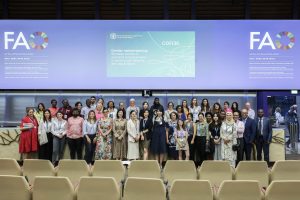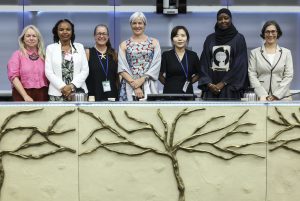A gender mainstreaming side event in the 36th edition of the Committee on Fisheries showcased inspiring success stories of women’s empowerment
By Matteo Luzzi (matteo.luzzi@fao.org), Gender Consultant, Food and Agriculture Organization of the United Nations, Rome, Italy (FAO) and Jennifer Gee (jennifer.gee@fao.org), Fishery Officer, Food and Agriculture Organization of the United Nations, Rome, Italy
July 2024 marked the unfolding of the 36th edition of the Committee on Fisheries (COFI) of the Food and Agriculture Organization of the United Nations (FAO), held in FAO Headquarters in Rome, Italy, from 8-12 July. COFI 36 attracted delegates, observers, and experts from around the world who joined vibrant discussions and collectively paved the way for supporting aquatic food systems globally. Over the week, these representatives gathered to deliberate on critical issues affecting fisheries and aquaculture, focusing on key areas for intervention and support for countries and communities relying on aquatic food systems for their livelihoods.
A significant focus of COFI 36 was the role of gender equality in fisheries and aquaculture, highlighting challenges and opportunities for women who play crucial roles in these sectors. FAO has long emphasized gender equality as integral to sustainable development. Following the provisions of the FAO Policy on Gender Equality 2020-2030 and in line with the targets of the Blue Transformation Roadmap, the Fisheries and Aquaculture Division is working to promote transformative actions that address the root causes of gender inequality, aligning these efforts with sustainable development goals (SDGs), particularly SDG 5 and 14.
On July 11th, the Sheikh Zayed Centre of the FAO Headquarters was at capacity with people joining the first side event in the history of COFI completely dedicated to gender mainstreaming and women’s empowerment. During the discussions, panelists had the opportunity to showcase and discuss first-hand experiences from women engaged in small-scale fisheries (SSF) value chains, such as Korea’s Jeju haenyeo traditional fisheries, coastal women in Costa Rica’s SSF and women in the Gambia’s oyster value chain. The event also highlighted experiences from establishing a Gender Desks in Tanzania to support fisheries and aquaculture and the most recent updates from women’s empowerment and gender equality in small-scale fisheries, with a closer look at the EU Mediterranean.
Women and men in fisheries and aquaculture value chains face specific constraints according to their gender identities and the resultant prescribed social norms, especially regarding expectations and opportunities. The experiences of women and men engaging in the aquatic food sector therefore differentiate themselves in terms of perception and narration. This is why a dedicated side event on gender mainstreaming was organized during COFI 36. Women actively driving change through their actions and contributions had the opportunity to come together, claim their space, and raise their voices to discuss key gender issues in their countries and the solutions to address them. The event raised awareness about women’s involvement in small-scale fisheries and aquaculture, highlighting how achieving gender equality is essential for reaching the goals of Blue Transformation.

Following the opening remarks of the Deputy Director General of FAO, Maria Helena Semedo, the event began by spotlighting the remote islands of Jeju, in the Republic of Korea, the co-organizing country for the event. Known as “sea women,” the haenyeo have maintained a unique, traditional fishery on the island of Jeju for centuries. Recently recognized as a Globally Important Agricultural Heritage System (GIAHS), the haenyeo are emblematic of sustainable, culturally rich fishing practices. Unlike many fisheries that rely on mechanized tools, the haenyeo are skilled free divers, gathering marine resources without the aid of scuba gear. They rely on their breath-holding capacity, physical endurance, and resilience to withstand underwater pressures and cold temperatures. As Jeonghwa Kim explained, these skills are acquired over years of training and passed down through generations, rooted in values of cooperation, mutual support, and harmony with nature. The haenyeo practice is sustainable and minimally invasive to marine environments, with harvesting techniques that protect the seabed for future generations. However, the tradition faces a serious threat as nearly 90% of current haenyeo divers are aged 60 or older. The declining number of younger divers has prompted the Korean government to support schools and training programs and to provide financial incentivizes for youth participation in the haenyeo way of life, preserving this cultural and environmental legacy.
While social and cultural networks are essential for sharing knowledge and resources within fishery communities, they are often not enough to protect women from the increased risks they face in value chain activities. Vivian Solis Rivera shared insights on the issues that women in Costa Rica’s SSF face, particularly the lack of formal recognition for their labour, which in turn restricts their access to social protection measures. Women, mainly involved in the gathering of mollusks, are invisible and perceived as “poor” despite their traditional knowledge and fundamental contributions to the sector: “The social protection system usually covers women in the sector, but because they are [perceived as] “poor” – so there is a change in the narrative that we really need to do”. Their contributions are undervalued, and they receive little support, often balancing the physically demanding, and time-consuming, work of mollusk gathering with heavy household responsibilities. Vivienne emphasized that organizations like ICSF have advocated for these women, helping them gain visibility and recognition. However, she stressed that government intervention is crucial to tailor specific social protection measures that fit women’s contributions in the sector and their related needs, based on incremented dialogue and collaboration between different institutions. Indeed, Vivienne explicitly urged governments to stimulate policy dialogue to strengthen the capacity of governments to implement the SSF Guidelines, emphasizing the need for a holistic approach that recognizes small-scale fisheries as a way of life for women. This shift would not only have an impact in terms of social protection, but also in terms of tenure and health rights, and women’s economic perspectives.
COFI 36’s focus on gender mainstreaming in fisheries and aquaculture was a historic moment, amplifying voices that have long been overlooked
Khadidja Diallo highlighted the experiences of women in Gambia’s oyster sector, where gender-based constraints affect their participation and safety. Many women lack swimming skills, limiting their access to safer harvesting areas and increasing their risk of accidents, including drowning. In response, the FISH4ACP project, in partnership with the Gambia Navy, introduced a swimming program, aimed at equipping sixty women with essential safety skills. This program not only allows them to reach previously inaccessible areas but also creates opportunities for safer and more sustainable income generation. Diallo noted that the program’s success hinged on the active involvement of the broader community, including family members and community leaders who helped overcome cultural biases against women learning to swim. This initiative demonstrated that women’s empowerment is a community-wide effort, breaking down cultural barriers to provide these women with the skills they need to work more safely and confidently.
Women’s empowerment is not only related to the development of skills and education. Rosa Caggiano highlighted the work of the MEDAC (Mediterranean Advisory Council), an EU-created stakeholder platform aimed at establishing a focus group on equal opportunities to promote gender balance in the fisheries sector. This initiative, and a recently-launched national platform for women in fisheries in Spain, seek to strengthen networks and associations, promote women’s leadership, and facilitate knowledge sharing. However, Caggiano pointed out that policy and institutional frameworks in the region often do not fully reflect the contributions of women’s organizations. To address these gaps, she proposed several areas for improvement, including advocating for equal pay, improving workplace safety, providing tailored capacity development and ensuring social protections for women. Additionally, she emphasized the need for more gender-disaggregated data, allowing policymakers to tailor interventions to the specific challenges women face in the sector.
Gender mainstreaming is a fundamental tool that helps governments and fisheries authorities develop technical competencies, gather data and create coherent strategies for enacting interventions aimed at fostering gender-equitable small-scale fisheries value chains. Lilian J. Ibengwe pointed to the example of the Gender Desk in Tanzania’s Ministry of Livestock and Fisheries, which clearly shows how national institutions can effectively turn commitment into action by investing in gender mainstreaming and women’s empowerment. This initiative brings together professionals from diverse backgrounds to address gender-specific challenges in fisheries. Despite facing initial difficulties due to a lack of gender expertise, the Gender Desk has made strides in building capacity and forming partnerships with organizations such as the Tanzania Women Fish Workers Association (TAWFA). Through advocacy and collaboration, the Gender Desk has integrated gender considerations into policy and practice, thereby supporting women’s leadership and participation in SSF at both the grassroots and national levels.
As the event drew to a close, Margaret Nakato from Uganda’s Katosi Development Trust posed a thought-provoking question to the audience: “Is it time to move from gender mainstreaming to feminist approaches?”. Nakato highlighted that while policies supporting gender equality exist, they often fail to make a tangible difference in women’s everyday work environments. She cited poor conditions in fish processing, including inadequate sanitation and dehydration, as persistent issues. Her question underscored the need for policies that not only exist in theory, but also directly improve women’s health, safety, and dignity in their work.
Vera Agostini, Deputy Director of FAO’s Fisheries and Aquaculture Division, concluded the event by reflecting on key takeaways. She highlighted the importance of storytelling and networking in raising awareness of gender equality issues, not only among committed advocates but also across broader audiences, including governments and the private sector. Agostini also emphasized the role of male allies as essential partners in supporting women’s empowerment and promoting gender equity within aquatic food systems. Finally, she stressed that systematic funding and support are necessary to move beyond discussions and towards concrete actions. Only through targeted investments can the sector realize genuine gender equality, enabling intersectional and transformative initiatives that benefit both men and women in aquatic food systems.

In summary, COFI 36’s focus on gender mainstreaming in fisheries and aquaculture was a historic moment, amplifying voices that have long been overlooked. The event underscored the critical role of women in SSF, highlighting how their empowerment and inclusion are essential to sustainable and equitable aquatic food systems and fostering further commitment to gender equality, as outlined by FAO’s policies, the SDGs and the Blue Transformation Roadmap.